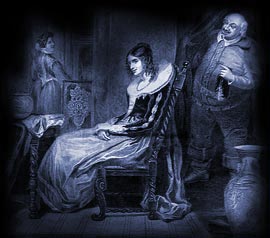Dr. Michael Delahoyde
Washington State University
THE MERRY WIVES OF
WINDSOR
ACT IV
SCENE i
Mistress Page has Evans examine her son William's achievements in Latin.
Mistress Quickly mistakes some of this for foul language.
An elaborate and intricate set of associations set in motion by the
reference to "lapis" provides more Oxfordian evidence, connected to
Nashe's "Master Apis Lapis" (Brazil 131-133; cf. Ogburn and Ogburn 1006).
The elder Ogburns consider this an interpolated scene (Ogburn and Ogburn
1005), suggestive in that Evans is the master and there is talk of "play":
Henry Evans trained Oxford's boy actors (Ogburn and Ogburn 1006). Slender
is now partly John Lyly, who worked with Evans as secretary-manager. "Fair"
evokes the "fair youth"; "O vocative" seems significant; Bacon seems
relevant; and "accusativo" may suggest that Quickly accuses Bacon (of
writing the scene?). The "caret" as editor's mark signified an omission
-- of a name? (Ogburn and Ogburn 1006). See especially Nina Green,
"'Edwardus is My Propre Name" [Brief Chronicles 2 (2010): 25ff]
for much of this and the overarching relevance of William Lily's Latin
Grammar, with its first lesson on nouns and names, including the
sample sentence: "Edwardus is my proper name" (Green 25).
|
SCENE ii
Falstaff tries again with Mistress Ford. This time, when Ford approaches,
the women disguise Falstaff as the "witch of Brainford," the maid's obese
aunt, whom Ford despises. "Falstaff cross-dressed as the 'old woman of
Brentford' is Shakespeare's only grown man dressed in woman's attire"
(Garber 360). Even unrecognized in drag, Falstaff gets a beating before
getting away. The women resolve to tell their husbands what they've been
up to. Note the legal reference to "fee-simple" (IV.ii.210-211).
SCENE iii
Bardolph informs the Host of the Garter of a German duke's approach and
three of his friends need horses to meet him. "Nothing earlier in the
play has prepared the audience for this, nor are we told either now or
later who the German duke is" -- so the incident is "hastily done and
poorly knit into the texture of the play" (Asimov 441). The Host plans
to rook them.
|

|
The scene is an inside joke for the Order of the Garter occasion. In 1597
a German count, Frederick of Mompelgard, Duke of Würtemburg, who had
been pestering Queen Elizabeth about his eligibility for the Order since
1592, was finally inducted, but without being notified and invited (so
that the court would not have to put up with him) (Ogburn and Ogburn 745;
Anderson 294).
SCENE iv
The wives have informed their husbands of the antics and Ford is repentent,
resolving never to distrust his wife again. They all will have one more
joke at Falstaff's expense: he is to dress up with horns on his head like
Herne the Hunter, a former gamekeeper of Windsor Forest said to haunt the
place, and meet the two women for a three-way. In folklore, Herne hanged
himself in, and supposedly his ghost haunted, the wood near to where Oxford
was roomed in Windsor when he was ill in 1570 (Anderson 40). Everyone else
will be involved in ambushing and terrorizing Falstaff. Each of the Page
parents secretly mentions again the differing plans for daughter Anne:
Page for the financially sound Slender; Mistress Page for the socially
connected Caius.
That Evans is responsible for teaching children (IV.iv.67) connects with
the Evans who served as stage-manager for Oxford (Ogburn and Ogburn 742).
SCENE v
Simple is sent to find out from the witch of Brainford, who has been seen
going to Falstaff's chambers, what Slender's chances are with Anne. The Host
shows Simple Falstaff's room and his bed "painted about with the story of the
Prodigal, fresh and new" (IV.v.7-8) -- a parable oddly connected to Falstaff
in Henry IV, Part 2 (II.i.144-145). Falstaff says the woman just left
but that she revealed the very matter: maybe yes, maybe no, she said. Simple
is delighted with this news. The host says his horses have been stolen by the
Germans and Falstaff is glad to hear of others' misfortunes. Then Mistress
Quickly arrives with a letter for Falstaff that promises an assignation with
the two women.
SCENE vi
Fenton elicits a promise of help from the host in his plan to elope with
Anne Page, who will "[re]present the Fairy Queen" (IV.vi.20). The Host will
grab a priest and meet them at an arranged place. "For they must all be
mask'd and vizarded" (IV.vi.40).
Act V
Shakespeare Index
